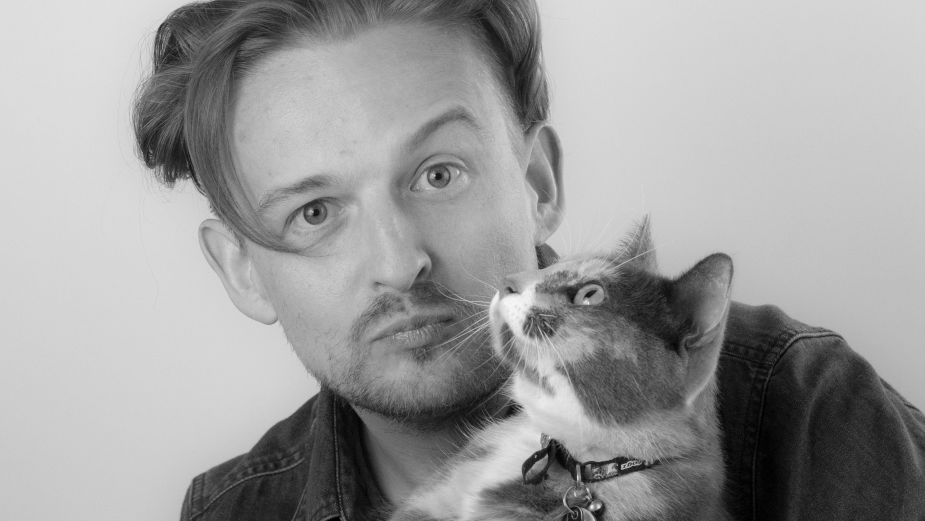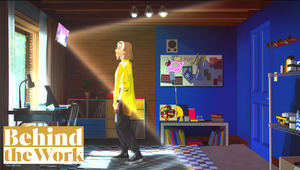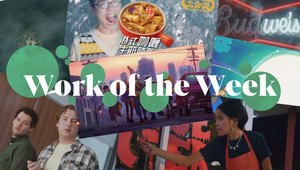
The Directors: Jeremy Mansford

A ‘storytelling octopus’ with a great gusto for all things weird, wild and wonderful, Jeremy Mansford is a maestro of all manner of mediums.
Name: Jeremy Mansford
Location: New Zealand
Repped by: Unlisted
Awards: A bunch, but none so dearly cherished as the 'Stupid' Hot Wing Challenge Record I hold in a Melbourne restaurant.
What elements of a script sets one apart from the other and what sort of scripts get you excited to shoot them?
Jeremy> A clear idea of brand and approach goals, combined with the right amount of freedom of how to get there is a great start. Nothing beats getting VIP access into that idea ballpark and having some shiny new goalposts to confidently plan and set up your attack for. To really get me excited and take full advantage of my talents; I thrive in projects that are bold and take risks with their ideas. Funky, spicy, freaky, weird, unusual, business-punk, ironically cringe are some good starter keywords.
How do you approach creating a treatment for a spot?
Jeremy> I think of the obvious creative approach or execution and then think of the polar opposite. I always like to go to weird and wonderful new places and have wild adventures.
If the script is for a brand that you're not familiar with/ don’t have a big affinity with or a market you're new to, how important is it for you to do research and understand that strategic and contextual side of the ad? If it’s important to you, how do you do it?
Jeremy> Of course - it’s super important! I believe it’s key to know where a brand has been and where it wants to go. How the concept or approach of the ad fits into this trajectory and also how it is different from competitors and where it sits in the market. Otherwise you’re piloting a rocket blindfolded with no landing gear. And where TF is Spock?
For myself there’s no eye-opening insight of how to acclimate to a brand/market. I just visit Prof. Google and digest as much as I can find that I feel is relevant to the project. Even with this research in mind, where possible I find it can be refreshing to have a jam on the conceptual side of things before becoming completely aligned. That way you can be free to explore new realms before getting too bogged down with identity/market framework.
What type of work are you most passionate about - is there a particular genre or subject matter or style you are most drawn to?
Jeremy> My mantra is based around three ideas - vibrance, explosive, fun. Any approaches or styles that can successfully deliver messaging or goals using these ideas get me most excited. I believe in creating work that not only achieves the goals of the campaign to the highest quality, but is entertaining and interesting enough for all to enjoy.
What misconception about you or your work do you most often encounter and why is it wrong?
Jeremy> More for projects out of the agency/commercials realm, but people are always surprised how much time and resources are needed to create my best work.
What’s the craziest problem you’ve come across in the course of a production – and how did you solve it?
Jeremy> Covid related logistics are an obvious one. I’ve been fortunate to not have too many major surprises during production. But some fun things to juggle have been:
Trying to direct a small crew while dressed as a Unicorn Businessman. To solve: Perseverance and patience.
Working with my cat. She is amazingly talented and a natural in front of the camera but a bit of a diva. Once again, perseverance and patience.
Working with talent in a very hot and heavy animatronic gorilla suit with limited hearing. Factoring in extra time for his health, safety and successful communication was key.
How do you strike the balance between being open/collaborative with the agency and brand client while also protecting the idea?
Jeremy> Establishing a relationship where constructive honesty can happen, and then execute problem solving with maximum creativity. I find some constructive feedback can feel harsher than it really is on the first read, but often when you give it a chance it can lead to better results.
What are your thoughts on opening up the production world to a more diverse pool of talent? Are you open to mentoring and apprenticeships on set?
Jeremy> I’m always happy to help, teach, provide information where possible. As long as I feel my level of knowledge is in the right place to provide meaningful knowledge, I’m game. Sharing quality information with others only leads to positives and a stronger, fruitful industry.
How do you feel the pandemic is going to influence the way you work into the longer term? Have you picked up new habits that you feel will stick around for a long time?
Jeremy> Remote working situations are definitely becoming the new normal. Luckily for me, I’ve been shaping my career for the last few years to work exclusively remotely. The most important habit I’ve learnt is to not rely on video/phone call dialogue only for communication and direction. Visual aids and documents are very important to replace any “in-person” interaction, to make sure everything is clear and concise.
With that in mind, how were your experiences with remote shooting during lockdown?
Jeremy> For any creative project, there’s likely many moving parts, and therefore a lush assortment of opportunities for things to go wrong. It’s for that reason, I think, that any successful studio has a well-trained, shredded and jacked problem-solving muscle. They are ready and primed to squash any surprise, or “act of god” that should arrive during production.So when Covid hit in 2019, and we had a Spotify campaign to create, our Unlisted international dream team all came out flexing and ready to tackle this new and (to say the least) unwieldy problem. We were all able to get on with it and create some really spicy, eye-tingling work from our homes, in our different countries, in different time zones and under different levels of lockdown.
Having remote and international team members is no longer a new thing. Having EVERYONE in your team remote could have been a challenge. With the agency and client in Singapore, myself and the live action shoot in New Zealand, production in Melbourne and animation in Buenos Aires we had a complex and potentially challenging pipeline - but with a fantastic and tenacious team mucking in to get it done; it just worked.
If good people are the number one crucial ingredient to a successful job in this climate, number two is without a doubt technology. Thankfully video calling and internet speeds have come a long way! And the capacity for a live feed direct from the camera to the client meant that the live action shoot and any sign-offs were silky smooth.
Your work is now presented in so many different formats - to what extent do you keep each in mind while you're working (and, equally, to what degree is it possible to do so)?
Jeremy> I think there is an art to it, and a balance. Lean too far into one format and the others don’t translate at all, but cater perfectly for every format and it can end up feeling bland. I like to prioritise a hero format[s] while keeping the others close. Designing shots so they shine in the hero format, but still deliver their key energy and goal in other formats.
What’s your relationship with new technology and, if at all, how do you incorporate future-facing tech into your work?
Jeremy> I’m very interested in some of the new tech out there, though I haven’t yet had the right opportunity to utilise any. The main frontier that interests me is storytelling using Unreal Engine. Building worlds and capturing performances using mocap and other exciting workflows that are becoming more and more accessible.
Which pieces of work do you feel really show off what you do best – and why?
Spotify - synthesising the supernatural powers of Unlisted and an international team to produce wickedness.
Mortal Kombat - giving weight, organic energy to a beloved IP. The experimentation of anime influences with 3D and hand drawn flavours.
Super Intro - explosive, multi disciplined and multi styled goodness slammed together.
The Mandalorian - The amalgamation of my love of cinematic shot design, anime and pixel art.













